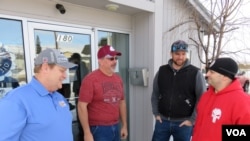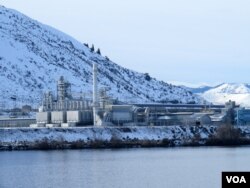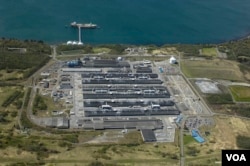Smelter worker Chris Morales of Wenatchee, Washington, remembers the day he learned he was being laid off - via a text message on a day off. "It is a feeling of surprise, panic," he said. "Now what? My wife has a good job; I'm fortunate for that. But still, I was counting on Alcoa, which has been around for years."
Sixty-four years here in Wenatchee, in fact. The American company now known as Alcoa was the first to commercialize aluminum production more than 100 years ago. That industry eventually employed tens of thousands of workers around the US. But aluminum smelting is now in steep decline domestically, and while Alcoa insists it will still make aluminum in the Pacific Northwest, many laid-off workers, like Morales, have doubts. He recalled the advice he got from plant managers: "something along the lines of, 'You need to go find another job.'"
So he is moving on, hoping service as a volunteer firefighter will turn into a career position.
Hundreds of jobs lost
The idling of the Alcoa Wenatchee smelter at the beginning of January cost around 420 jobs, which paid around double the average wage of that area. Another 465 workers at another Alcoa smelter outside Ferndale, Washington, are worried.
Plant manager Barry Hullett explained the situation at a hearing before state Senators. "It is important to notice the difference between a curtailment and a closure. When we curtail a plant, we keep it in operating condition so it may be restarted. That's different than a closure." He noted that what the remaining Pacific Northwest smelters face is indefinite curtailment.
Hullett hopes market conditions "will change for the better." But the price for aluminum fell around 30 percent last year. "The metal price shouldn't stay at this level," he said. "It's at historic lows. So commodity cycles should change. Hopefully when that does, we'll be positioned to keep operations going in Washington state."
Growing international competition
Fifteen years ago, there were 23 active aluminum smelters in the U.S. Today there are only six - including that one in Ferndale - and by mid-year, there could be fewer after scheduled closures.
Karen McBeth follows aluminum's fortunes for the industry news service Platts. She says U.S. firms face tough competition from newer smelters in China and other countries."It's interesting how China has just completely overtaken the industry," she said. "It is true of a lot of metals markets, not just aluminum. They now account for about half of global production and half of global demand. So they are a huge factor."
McBeth is rooting for a U.S. comeback, but not counting on it. "At the moment though, a number of these smelters are being dismantled. It is going to be a little late for the U.S. industry to try to make a comeback if the price doesn't improve soon."
She notes that aluminum production is very energy intensive, so any revival might also require favorable power deals. New York State just reached a subsidy deal to keep the northeast's only remaining smelter in operation for three more years.
Back in Washington state, longtime smelter worker Kelley Woodard says losing metal production hurts U.S. strategic interests.
"I'm not a big fan of government supplying a lot of money to corporations," he admitted. "But I, as a citizen, think it is vital to keep some type of aluminum production in the U.S. I am hoping, hoping a lot, that the Northwest can maybe keep a couple smelters around."
The Chicago-based Century Aluminum Company and the United Steelworkers Union are lobbying for trade sanctions against Chinese aluminum exports. The U.S. Labor Department approved special retraining and dislocated worker benefits recently, agreeing that American aluminum industry workers have been harmed by foreign trade.
What are they doing now?
Clayton Verellen, age 33
Alcoa Wenatchee smelter worker for five years, pot tender
Family: Married with two kids, ages 8 and 1.
“I liked being a pot tender,” Verellen said about his job in the heart of the smelter. He had ownership over a section and could see the fruits of his work. “If you did good, you saw the benefits right away. If you did bad, you saw the consequences generally right away too.”
What next: Verellen is coaching his son’s ski racing team this winter and reconnecting with family, before going back to school in spring for a course of study to be determined.
Chris Morales, age 39
Alcoa Wenatchee smelter worker for five years, mostly fixing furnaces.
Family: Married with three little girls.
"The job is far from glamorous," said Morales. He will miss the camaraderie. "What I enjoyed was the relationship I built with my crewmembers. You learn to rely on people to get work done."
What next: Hoping to be hired as a career firefighter in Douglas County after serving many years as a volunteer with a county fire district.
Kirk Peterson, age 46
Alcoa Wenatchee smelter worker for 18 years, electrician.
Family: Divorced, two young kids.
"I loved what I did," said Peterson about his time at the smelter. "It wasn't a total shock," to learn the plant would be idled. "We had heard that we were losing three, four or five million dollars a month. We all kind of thought in the back of our minds that at some point they got to cut the bleeding," Peterson recalled. "It was still a surreal feeling."
What next: Peterson's electrician skills are transferable, but he is not thrilled about the likely need to travel to far-flung job sites.
Kelley Woodard, age 56
Alcoa Wenatchee smelter worker for 32½ years, equipment operator
President, Wenatchee Aluminum Trades Council.
Family: Married with one son in college and one other grown son
"I've seen it all, been there a long time," said Woodard. This is turning out differently than past down cycles, though. "We would have our low times. We'd curtail, but then it wouldn't be as bad as what everybody predicted and we would come back. So I was having hope that somehow this would be like that. It would be rough, but we would get through it somehow."
What next: Woodard still reports to work as part of a skeleton crew that monitors and maintains vital systems at the Wenatchee smelter. He does not know how long this unexpected extension in his job will last, but hopes to get "at least one more year" in before taking retirement.










